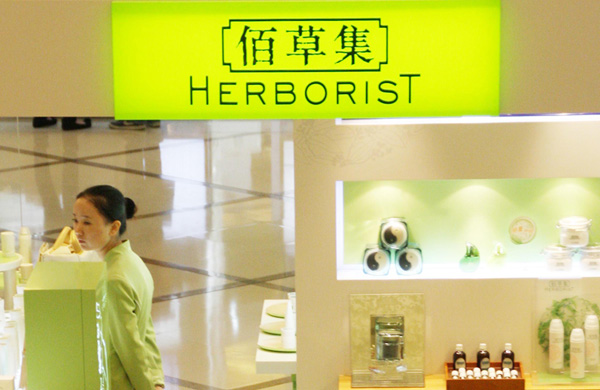 |
|
A Herborist's counter at a supermarket in Beijing, Oct 16, 2010. [Photo/IC] |
The company has been seeking to break global brands' dominance of premium cosmetics in China with its own Herborist line, inspired by traditional Chinese medicine and herbal ingredients.
In recent years, Jahwa has sought to put a global spin on Herborist by selling it in Europe through cosmetic retailers Sephora and Douglas.
In 2015, Herborist was the only Chinese name to make the top 10 cosmetic brands by market share at department stores in China, at number eight, according to China Market Monitor.
But like its peers, Jahwa's reliance on traditional channels has weighed on its performance. Revenue growth in 2015 shed 5 percentage points from five years earlier to 9.58 percent. Excluding non-recurring items, profit growth slid for the first time in a decade.
Jahwa said the slowdown in its own business has come largely as a result of overall weakness in the cosmetics sector. Cosmetics retail sales growth moderated from 13.3 percent in 2013 to 8.8 percent in 2015, according to the National Bureau of Statistics.
For skin care products in general, growth at department stores has almost stagnated, Jahwa said in a response to an inquiry over its 2015 financial results by the Shanghai Stock Exchange.
As a result, domestic cosmetics brands including Jahwa have been the the most active in embracing e-commerce, where they see a chance in overtaking global titans that have been slow to adapt to China's increasingly digitalized retail scene.
Very few international cosmetics brands can make the monthly list of top 10 best-selling cosmetics on Alibaba's e-commerce site. Domestic brands such as Pechoin, Hanhoo, Chando and KanS lead cosmetics sales online.
As a result, foreign brands have been losing share in skincare and makeup to Chinese competitors, by roughly 2 to 5 percent during each of the past two years, according to Bain.
Jahwa is hoping that 20 percent of its sales of cosmetics and personal care products sales will be made online by 2018. Last year, its e-commerce revenue stood at 557 million yuan (about $83.3 million), or 9.5 percent of the company's total.
